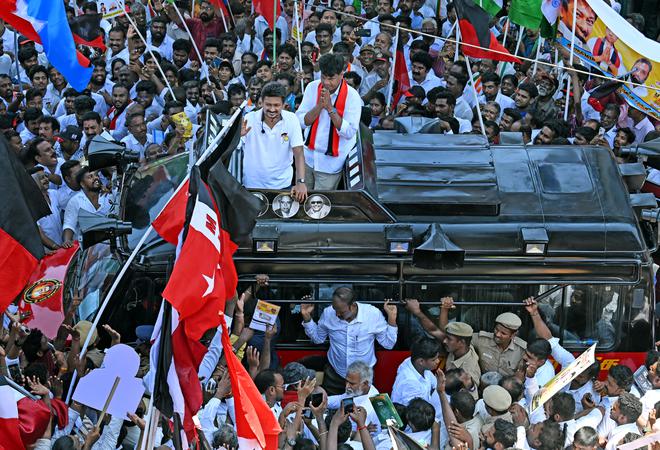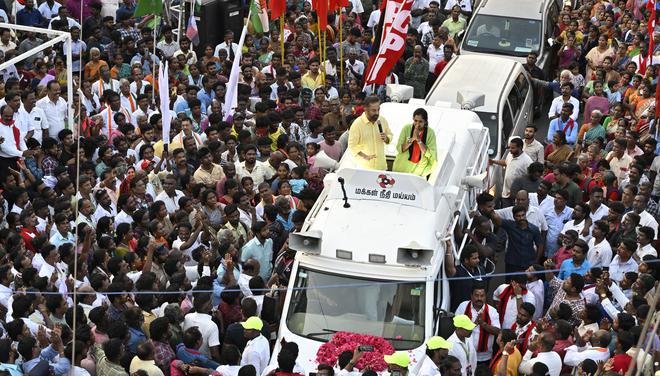In 1984, combined vote share of the DMK, AIADMK fronts hit a high of 96.91%; low point was in 2014, when a BJP-led third front helped limit the Dravidian majors’ alliances to just 71% of votes
Coalitions that included Tamil Nadu’s two major and opposing Dravidian forces — the DMK and the AIADMK — have claimed most of the State’s vote share in the 12 Lok Sabha elections held since 1977.
The combined vote share of the two coalitions hit a high of 96.91% in 1984, and never went lower than in 2014, when they garnered 71.07%. In 2014, the AIADMK, or All India Anna Dravida Munnetra Kazhagam, contested all of the State’s 39 Lok Sabha seats independently; the DMK, or Dravida Munnetra Kazhagam, has never gone solo since 1977.
An analysis of the State’s voting patterns shows that in the five elections held between 1977 and 1991, the combined vote share of the two opposing fronts was 90% and above. In each of those elections, barring the one held in 1980, the AIADMK had aligned itself with the Congress. In 1980, the AIADMK had an electoral understanding with the Janata Party and the two Left parties, while the DMK allied with the Congress.
On almost on all other occasions, the State’s present ruling party partnered with non-Congress parties such as the Janata Party, Janata Dal, and the two Left parties — the Communist Party of India (CPI) and the CPI (Marxist). Except in 1977 when it was part of the AIADMK-Congress combine, the CPI has always allied with the DMK.

New entrants
The entry of the Pattali Makkal Katchi (PMK) to the electoral fray in 1989 caused a marginal reduction in the combined vote share of the fronts that included the DMK and the AIADMK. In fact, seven years later, when the “anti-Jayalalithaa wave” was at its peak in 1996, their collective vote share went down to about 81%. This could be attributed to the presence of the coalition led by the Marumalarchi Dravida Munnetra Kazhagam (MDMK), the PMK, and the BJP, the three of which had secured around 15% of votes, even though they each faced the electorate on their own.
However, there was an improvement in the combined vote share of the fronts of the two Dravidian majors in 1998, when the AIADMK staged a comeback and its alliance bagged 30 seats. Again, there was a dip the next year when the Tamil Maanila Congress (Moopanar), that had contested the 1996 and 1998 elections as an ally of the DMK, formed its own coalition and netted about 9.4% of votes.
The participation of the Desiya Murpokku Dravida Kazhagam (DMDK) in the 2009 Lok Sabha poll again disturbed the situation as it obtained a little over 10% of votes.
Third front
The trend continued five years later, with a perceptible drop in the combined vote share of the fronts of the State’s principal political players, though the AIADMK grabbed 37 out of the 39 seats. The third front, which included the BJP, PMK, DMDK, and MDMK, walked away with 18% of votes in 2014.

Five years ago, in 2019, the Dravidian majors had all the established parties under their respective folds. Yet, the collective vote share of the two coalitions did not touch the 90% mark, only reaching 84%. Three non-allied parties — the Amma Makkal Munnetra Kazhagam (AMMK), the Makkal Needhi Maiam (MNM), and the Naam Tamilar Katchi (NTK) — contested on their own, securing 12.85% of votes.
This time too, the BJP has established a front that includes the PMK, the TMC(M), the AMMK, and a couple of other smaller parties. While the MNM is extending support to the DMK-led front, the NTK is contesting without any allies. It remains to be seen how much of the State’s pie they can carve out in 2024 from the continuing dominance of the DMK and the AIADMK coalitions.







